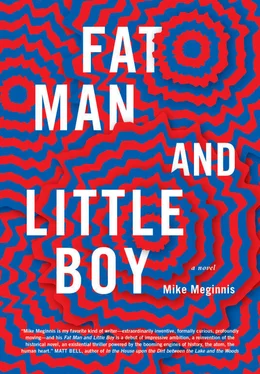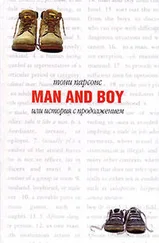John, dressed for work in a large gray shirt and leather suspenders, follows Matthew out of their cabin. Matthew’s dressed for school: short pants, blue-collared shirt, brand new beret. There are more than three feet between them at all times—the length, roughly speaking, of the fat man’s arms. This is an ominous radius.
Matthew mounts the bike. He puts one hand against the cabin wall and leans that way, raising his kickstand from the mud. He heels it back. Now he’s upright, ignoring his dependence on the wall. John may offer Matthew help. From this distance it’s impossible to hear. John grips the bike by its seat and sets it right. Matthew tries to pedal away. John holds him still and slips some cash into his pocket. He pushes Matthew along. The bike teeters, finds its balance. Matthew rings his bell three times.
Rosie likes to see them get along. The sun is rising. The air is cold with a bit of wind. She’s still asleep. Rosie needs her coffee.
John waves at her and totters her way. He’s getting larger. Knock him on his side and you could roll him like a barrel. Someone could get squished.
He says, “Have you been to the museum yet today?”
“Not yet,” says Rosie, rubbing her eyes beneath her glasses. The grease of her fingers is of course smeared on the lenses when they fall back into place. “I was going to have breakfast.”
“Can I cook for you?” He thumbs his suspenders. “I swear I’ll do better than last time.”
Rosie is wiping her glasses clean on her blouse. “You better. I still can’t get the taste of it out of my mouth.”
“I told you what to do about that.”
“And if I get sloshed, who’s going to keep you and your little hellion from burning the place down?”
John looks genuinely hurt. “We would never do a thing like that.”
She touches his arm, sliding her glasses back into place. “Just joshin’. I know you wouldn’t. Although, you know, he might.”
John makes her puffy pancakes. He puts fat cubes of butter on each stack and sprinkles a generous helping of powdered sugar over each plate, then the syrup. She makes her own coffee while he works the kitchen cabin’s griddle. Her griddle, her pancakes, her butter, her sugar, her syrup. The fat man is liberal with her things. As the pancakes cool, he fries bacon. Grease flecks his shirt. The part of her that wants to sleep in peace tonight is at odds with the part of her that wants to calculate the meal’s cost. An offer to cook is an offer to use her things, is an offer to further deplete her savings. He surely means to be kind. If he added up the money he might save by eating with her, if this is a shrewd money-saving strategy, then he is at least taking care in the cooking. He knows she has a weakness for butter, and that she likes her bacon soft and yellow.
If you don’t have to pay electric, gas, or water, and if you bought the land outright, you can run a hotel on a war widow’s government checks, assuming nobody comes there to stay. With several guests—and Rosie has only the newlyweds, Mr. Parcel, and Mrs. Dryden—one is required by decency and business sense to purchase more provisions than those guests will use: they expect options. No one wants to look at his neighbor and see an identical spread on the plate. They’ve got to feel special. So there’s excess. Given time the unused eggs go rancid. You’ve got to throw those out. Sometimes Rosie gets antsy; she has a lot of egg dinners. The bread molds but you can trim it away if you catch it early, sometimes even if you don’t. Then the rest is yours.
Rosie does resent living on her own scraps. The fact this bacon would go to rot if they didn’t eat it, the fact the butter might otherwise sour, complicates her calculations. It might be saving them money in the long run. The long run is a lot to think about.
They don’t say much while they eat. John drinks her orange juice. She knocks back two mugs of coffee before she’s halfway through the pancakes. His silverware—her silverware, in his hands—is loud on her plates.
“We’ve got a new guest on the way,” says Rosie. “He speaks Japanese .”
“That puts us at five languages. My French and yours, our collective English, your burgeoning Spanish, Mrs. Dryden’s Chinese, and now the newcomer.”
“My Spanish does not burgeon. It putters at best,” says Rosie, lowering her eyes. “It’s too many guests. The budget will be very thin. If we can attract a few more, perhaps find another retired lodger—”
“Bless Mrs. Dryden,” says John.
“—Then we might start to turn this ship around. There might even be a margin.”
“A profit margin?”
“The same.”
Budgetary concerns aside, it’s nice to sit with him this way. She pours her third and final coffee. John has calmed in recent days. It shows especially in his eating. He used to be frantic, furtive—weird, frankly. He would hold things at a certain distance, on fork-end, until he was ready, and then he would take them in one bite. Chew, gulp, swallow. The next morsel, meanwhile, held again at that ominous distance. Now he’s holding his rasher of bacon in his bare fingers as he speaks, waving it like a conductor’s wand.
He washes the dishes. They will be used again in several hours, when their guests—the retired Mrs. Dryden, the lazing newlyweds, and the old man Parcel—wander from their cabins. Now they are curled in their blankets or loading coal into the fire, trying to squeeze a little more warmth from the stove and a little more sleep from the morning.
“Did you want to see the museum now?” says John. “If you have a moment. I know you’re busy.”
“I am busy,” says Rosie. She doesn’t want to think about it. “I’ll have a look. The museum is a very important part of what we’re here to do.”
With his slow gait, he leads her there. He touches the back of his neck often and lets his head hang. From behind he looks like a lump. Already his armpits are deeply stained. She wonders how he does his laundry. There are whole days they don’t see each other, though so few live or stay here. He never talks about himself.
They pass under what is, at first glance, an unremarkable tree. Brown bark, green leaves, standard. Rosie doesn’t know about trees beyond a few species. Poplar. Oak. Redwood. Sequoia. Pine. Willow. She could not, with any confidence, assign those names to any actual existing trees. She might know a willow. This one is like a willow, but with a thinner trunk, and fewer branches, though tightly packed. They are not as long as a willow’s would be. They do droop in a certain way—they seem to weep. The green teardrop leaves flutter on the breeze. The breeze stops. With a sudden rustling they snap to one angle. As John passes, the tree reaches for him and follows. Or it seems.
Rosie asks, “Has this tree always been here?”
He stops and slowly turns. “It has.”
All the tree’s branches are still, quiet, strained for reaching. Its trunk bends very slightly toward him. A single leaf comes loose and falls on him, sticking to his face, just next to his mouth’s corner.
Rosie walks beneath the tree. It does not reach for her.
They come to the museum cabin, once the prisoners’ playhouse. He opens the door with such hesitance that she worries what he’s done.
“It’s wonderful,” she says.
At the entrance the ground is empty but for signs of shoes: skid marks from old leather; mud crescents from heels; scuffs. As if just the day before several dozen people had been trudging, walking, pacing, running through. Rosie wonders how many were made by John himself. How many were intentional? Whose shoes did he wear while he did it?
The walls are covered with paintings and a sequence of cartoons featuring Mickey Mouse. No artists are credited beyond their signatures, if they left them, because so few can be identified. Here a portrait of a grave little girl with hair too thin. Here a watercolor of several bright, exotic birds perched together on a tree. Here a painting of a broke-down cabin of the sort this one used to be, the lines precisely accurate, the colors pointedly wrong, even ill.
Читать дальше












